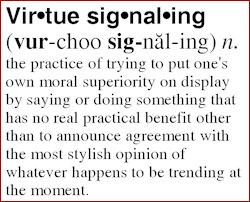by Dr. Colin Eakin

 ere we go again. With a tiresome repetition like that of tax bills, springtime allergies, and NCAA football champions from the deep South, a quasi-Christian media outlet has published another appeal to "evangelicals" to lay down arms and come to some general agreement as to what the Bible says about origins.
ere we go again. With a tiresome repetition like that of tax bills, springtime allergies, and NCAA football champions from the deep South, a quasi-Christian media outlet has published another appeal to "evangelicals" to lay down arms and come to some general agreement as to what the Bible says about origins.These appeals, mind you, always seem to arise from those proposing an alternative to the straightforward reading of the text, one which will update our biblical understanding based upon "new revelations" from the worlds of both "science" and "biblical scholarship." We are now being told by "experts" how "ancient Near East cultural understanding" can broaden our grasp of how the Bible reconciles with the world we see around us. The articles always seem to be written as if truly enlightened evangelicals have no problem with the latest learning and have advanced well beyond these core proposals, but here are some basics that even evangelical Neanderthals (pardon the pun) should be able to get behind.
 The latest salvo is from Todd Wilson, president and co-founder of the Center for Pastor Theologians, which was published January 4, 2019 in Christianity Today. Wilson begins by disclosing how, some time ago, his conservative-on-many-issues congregation had some "heartburn" when its closely held, literal six-day creation scheme was assaulted by its new pastor's belief in evolutionary creationism. This understandably led to a "tension-filled season," during which the church "grappled" with its "doctrinal boundaries." The upshot of this grappling was the codification of "ten theses on creation and evolution that we believe (most) evangelicals can (mostly) affirm," what they termed (in an apparent nod to C.S. Lewis) "Mere Creation."
The latest salvo is from Todd Wilson, president and co-founder of the Center for Pastor Theologians, which was published January 4, 2019 in Christianity Today. Wilson begins by disclosing how, some time ago, his conservative-on-many-issues congregation had some "heartburn" when its closely held, literal six-day creation scheme was assaulted by its new pastor's belief in evolutionary creationism. This understandably led to a "tension-filled season," during which the church "grappled" with its "doctrinal boundaries." The upshot of this grappling was the codification of "ten theses on creation and evolution that we believe (most) evangelicals can (mostly) affirm," what they termed (in an apparent nod to C.S. Lewis) "Mere Creation."How did they do with their theses? Herewith is a commentary on their evolutionary "Wittenberg door":
- The doctrine of creation is central to the Christian faith.
They got this one right. In fact, this is a dead-on, stand-alone truth. Wilson proposes that the doctrine of creation belongs in the same strata as the doctrines of the Father, Christ, the Spirit, and soteriology at the core of the Christian faith, and he is absolutely correct. Make no mistake: Genesis 1-2 is so vital to proper biblical understanding that if one does not comprehend it rightly, one will err repeatedly in attempting to assimilate the remainder of the Word of God. Want to know a simple way to confirm one has found a biblical church that likely gets the gospel right and upholds sound doctrine in other areas? Ask its pastor if he reads and teaches Genesis 1-2 in a literal, historical manner. The correlation is remarkable.
- The Bible, both Old and New Testaments, is the Word of God, inspired, authoritative, and without error. Therefore whatever Scripture teaches is to be believed as God's instruction, without denying that the human authors of Scripture communicated using the cultural conventions of their time.
Here, again, they got it right—mostly. We might add to the inspiration, authority and inerrancy of the Word of God its completeness, sufficiency, perspicuity, necessity, efficacy, certainty, immutability, universality, vitality, and theocentricity, as these qualities are no less applicable to the Word of God. But we concede the point. Further, it is axiomatic that whatever Scripture teaches is to be believed as God's instruction. In other words, when the Bible speaks, God speaks.
The dog whistle in Thesis #2 comes in the last clause. Wilson writes, "No amount of stress on a 'high view of the Bible' should cause us to inadvertently downplay the human side of the equation."
Okay, fair enough on its face. The Bible did have human authors who wrote according to "cultural conventions" of their time. If that is all that is intended, fine. And if he is also implying that readers of the Bible must be attuned to the grammatical and contextual aspects of the writing, more power to him. But if the implication is that the humanity of the Bible's authors somehow obscures God's actual message and thereby diminishes our confidence in understanding it, he is wrong. The humanity of the authors of Scripture does not in any way confound the communication of God in His Word. Just because the Bible had human authors beginning 3500 years ago does not mean that their "cultural conventions" somehow limit our modern comprehension of what they were saying and how it applies today. God inspired His human authors and their "cultural conventions" to say exactly what He meant to say and how He meant to say it, with a message that transcends time, as comprehendible today as it was to those to whom it was first written.
- Genesis 1-2 is historical in nature, rich in literary artistry, and theological in purpose. These chapters should be read with the intent of discerning what God says through what the human author has said.
Wilson begins to reveal his true colors in his commentary on Thesis #3 when he writes, "Of course, there is much to debate about how to interpret Genesis 1-2" (those colors come into even greater relief later in the article when he favorably references theologian Karl Barth and historian Mark Noll, as well as his use of the NRSV). He goes on to suggest the need for "a balanced approach to the question of the literary genre of Genesis 1-2." Wilson subdivides Genesis 1-2 into a proposed composite of historical, theological and literary types, and insinuates that if this portion of Scripture can be designated as literary and theological as well as history, it would somehow diminish its reliability as a source of historical information.
Says who? Only those trying to retain some claim to orthodoxy as they simultaneously seek to undermine the information of the text by reclassifying it as something other than history. So let us be clear here: Genesis 1-2 is history. A sixth-grade student can identify it as such. Yes, the text does yield tremendous theological implications, as any biblical historical text might, and it has a certain literary style. But neither of those designations alters in any way the factual, historical information we are reading about the world and its occupants. Genesis 1-2 is God's clear-cut revelation of how things began, designed to inform the highest order of His creation about something they would have no other way of knowing. Only those who wish to impose faulty paradigms on Scripture have any inclination to consider Genesis 1-2 as some form of literature other than history (e.g. legend or poetry), as if that literary designation might somehow disable its plainly evident interpretation.

- God created and sustains everything. This means that he is as much involved in natural processes as he is in supernatural events. Creation itself provides unmistakable evidence of God's handiwork.
Again, pretty good, up to a point. God certainly has created everything and sustains it moment by moment (Job 12:10; Acts 17:28; Heb. 1:3). His direct handiwork is no less a part of natural processes as it is with supernatural ones. Wilson makes a good point about the tendency even of evangelical Christians toward deistic thinking, often slipping "into patterns of thinking that exclude God from the routine workings of nature, like the rotation of the stars, the formation of clouds, or the grass as it grows." He rightly references Psalm 104 as evidence of God's continuous, direct ordering of the natural world.
But the Bible nowhere states nor implies that study of the natural world can divulge any knowledge about its origins. Yes, as Wilson offers, "the heavens declare the glory of God" (Ps. 19:1), but not in any way that brings to light the process that led to their formation. In fact, it is no coincidence that after David extols the natural, or general, revelation of the cosmos in the first portion of this Psalm (Ps. 19:1-6), he follows it with an exquisite overview of the special revelation encompassed in the Word of God (Ps. 19:7-11). Why this juxtaposition of the general and special revelation of God? David knows that general revelation only goes so far in revealing who God is and what He has done, and that ultimate knowledge of God and His work must come from His self-revelation, as can only be found in His Word.
- Adam and Eve were real persons in a real past, and the fall was a real event with real and devastating consequences for the entire human race.
Wilson gets this thesis exactly right as stated, which is commendable. But his substantiating commentary is so problematic that it leads him to unbiblical conclusions. Yes, Adam and Eve were real persons in the real past, who really fell with real and devastating consequences for each and every one of their descendants. Wilson then (correctly) reports that this reality is under considerable challenge within modern evangelical Christianity. Why is that? Because, according to Wilson, "the genetic evidence, at least as we now understand it, makes belief in an original human pair doubtful if not impossible." He then predicts, " . . . in 20 years' time, support for Adam and Eve as real persons in a real past will be a minority view even within evangelicalism." And what if that happens? Wilson continues: "Should this come to pass, I remain confident that the Christian faith will survive, even though this will require some reconfiguration of our deepest convictions."
 Just how "Christian faith will survive" despite the "reconfiguration" of its "deepest convictions" is not at all clear from Wilson. In reality, this would be an utter impossibility, because when one reconfigures the deepest convictions of a particular faith, then that faith is no longer said to exist. Give up a real Adam and Eve with a real fall bringing real consequences to the entire human race, and you might as well describe a new religion, for you have just severed orthodox Christianity from its doctrinal moorings. To deny a real Adam and Eve is to call the Bible erroneous and God a liar, because He says all humans derive from this original pair (Gen. 3:20; Acts 17:26). To deny a real Adam and Eve is to contradict the Lord and Savior, Jesus Christ, who references them as the basis for understanding God's concept of marriage (Mt. 19:4; Mark 10:6). And to deny a real Adam is to nullify the manner by which God says humans might be reconciled to Him, because the only ones He justifies are those born into sin through Adam and then reborn into righteousness through Christ (John 3:3-7; Rom. 5:15-19; 1 Cor. 15:45-49).
Just how "Christian faith will survive" despite the "reconfiguration" of its "deepest convictions" is not at all clear from Wilson. In reality, this would be an utter impossibility, because when one reconfigures the deepest convictions of a particular faith, then that faith is no longer said to exist. Give up a real Adam and Eve with a real fall bringing real consequences to the entire human race, and you might as well describe a new religion, for you have just severed orthodox Christianity from its doctrinal moorings. To deny a real Adam and Eve is to call the Bible erroneous and God a liar, because He says all humans derive from this original pair (Gen. 3:20; Acts 17:26). To deny a real Adam and Eve is to contradict the Lord and Savior, Jesus Christ, who references them as the basis for understanding God's concept of marriage (Mt. 19:4; Mark 10:6). And to deny a real Adam is to nullify the manner by which God says humans might be reconciled to Him, because the only ones He justifies are those born into sin through Adam and then reborn into righteousness through Christ (John 3:3-7; Rom. 5:15-19; 1 Cor. 15:45-49).
Wilson says Paul's argument in Romans 5 along with Adam's presence in genealogies (Gen. 5; Luke 1) keeps him tethered—for now—to the traditional view of a real Adam and Eve, but he leaves open the possibility that future scientific developments might cause him to reconsider. Which begs the question: what might those future "scientific developments" be? Science relies upon the certain operation of uniform constants. Given that, on what basis can we be certain that the scientific constants we can measure today, such as the speed of light, were operating in the same manner at the moment of creation? We cannot. So if we are only speculating that the constants of today were present in unchanged form at creation, how then are conclusions based upon such speculation "scientific?" This is an unsolved quandary for Wilson and all his evolutionary ilk. The same goes for the "genetic evidence" to which Wilson alludes. Wilson is basing his conclusions upon genetic similarities found between humans and certain other species. But genetic similarity does not confirm shared ancestry. Moreover, genetic inheritance would depend upon genetic makeup at the moment of creation, which, again, cannot be known for certain.
On a textual level, whatever happened to the "full-throated" endorsement of inerrancy Wilson proclaims at the beginning of his article? As an inerrantist leader of "pastor theologians," one presumes Wilson would always subject his doctrinal beliefs to the exact text of Scripture. Specifically, we expect him to know that when God uses the term bara for "created" in the first statement in His Word, He is specifying that such a work is ineligible for scientific inquiry. As opposed to the other Hebrew terms for "create" in the Old Testament (e.g. yatsar and asah), the term bara is used only with God as its subject, and only in the creation of marvels never before known. The use of the term denotes a development of something completely outside the boundary of the established order, and not subject to the constraints of uniformity that govern science. As such, God's use of the verb bara in the first verse of His first book should notify all to pay attention, because the information that follows cannot be discerned through observation of natural phenomena (i.e. scientific inquiry).
Untroubled by this, Wilson then proceeds to a very troubling deduction: "It may be the case that faithful Christians will develop biblically legitimate and theologically sensible ways of explaining the gospel apart from a real Adam and Eve." For someone claiming to uphold the inerrancy of Scripture, this is certainly an incongruous detour. How in the world could Christians ever be "faithful" by refuting what God has explicitly said about this pair of original humans? And how would a revised "gospel" look if the "last Adam" did not become a "life-giving spirit" because the "first Adam" never became a "living being?" (1 Cor. 15:45)? Apart from a real Adam and Eve, the entire structure of Christianity as presented in God's Word becomes a house of cards.
Finally, instead of a clarion call to defend God's Word against any and all specious theories masquerading as knowledge, Wilson concludes, " . . . the better part of wisdom is maintaining a spirit of engaged conversation on this issue" (italics his). Really? What happened to the New Testament's repeated calls for the vigorous censure of falsehood (2 Tim. 4:2; Titus 1:9; Eph. 5:11; 2 Cor. 10:5; 2 John 8-11; Jude 3-4)? It is the harbinger of apostasy for believers to have their doctrinal convictions always subject to supposed discoveries of worldly knowledge, be they scientific or sociologic. Paul warned the Ephesians that they should "no longer be children, tossed to and fro by the waves and carried about by every wind of doctrine, by human cunning, by craftiness in deceitful schemes" (Eph. 4:14)—the precise muddle in which Wilson, by his own words, appears to find himself.
We will continue with evaluation of Wilson's final five theses in the next post.
Dr. Colin L. Eakin Pyromaniac
|

 Dr. Eakin is a sports medicine orthopædic surgeon in the Bay Area and part time teacher at Grace Bible Fellowship Church's Stanford campus ministry. He is the author of
Dr. Eakin is a sports medicine orthopædic surgeon in the Bay Area and part time teacher at Grace Bible Fellowship Church's Stanford campus ministry. He is the author of 
 f you listen carefully to the definition I gave, virtue signaling
f you listen carefully to the definition I gave, virtue signaling  is when you affirm a trendy, politically correct, or socially popular position in order to claim the moral high ground or garner praise—especially when you have little intention of doing anything else about the issue you are publicly wringing your hands over.
is when you affirm a trendy, politically correct, or socially popular position in order to claim the moral high ground or garner praise—especially when you have little intention of doing anything else about the issue you are publicly wringing your hands over. ut:
ut:










